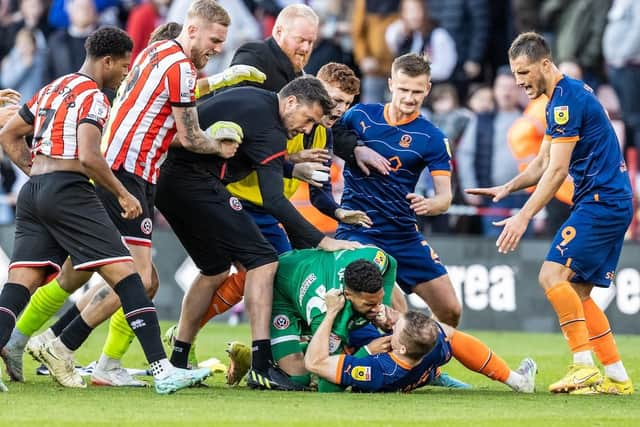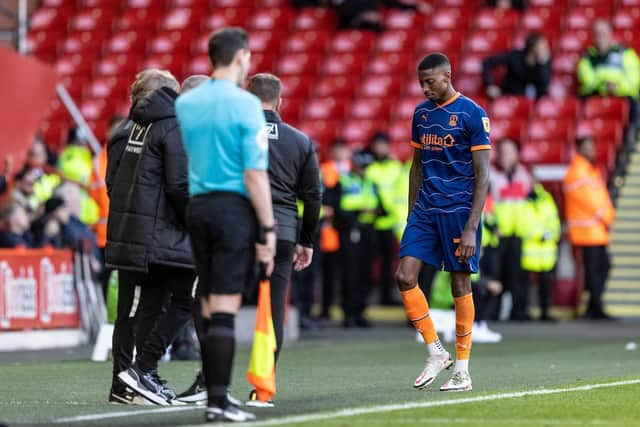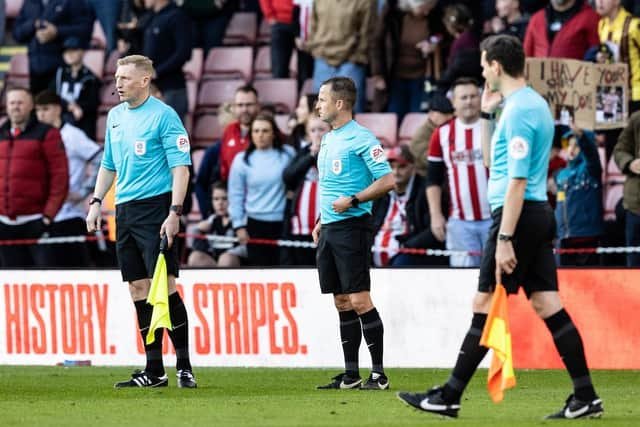Why Blackpool will question Sheffield United's latest fine as FA publishes written reasons for Battle of Bramall Lane charges
and live on Freeview channel 276
The FA have confirmed the Blades have been fined just £15,000 for their third breach this season of FA Rule E20.1, which is a failure to ensure their players conducted themselves in an orderly fashion.
In fact, the three charges have all been brought about in the space of just four weeks.
Advertisement
Hide AdAdvertisement
Hide AdBlackpool, by comparison, were fined £25,000 for their second breach this season following the fiery encounter at Bramall Lane earlier in the season.
The Seasiders had already been charged for a similar incident at Burnley back in August (£10,000), while they were also fined last season following the derby win against Preston North End at Bloomfield Road (£5,000).
It means Blackpool have been charged three times in the space of 12 months, with their fines totalling £40,000.
Sheffield United, by comparison, have only been fined £35,000 for their three charges in the space of four weeks following incidents in their games against Blackpool (£12,500), Norwich City (£7,500) and Bristol City (£15,000).


Advertisement
Hide AdAdvertisement
Hide AdThe Gazette approached The FA for clarification on why Blackpool had received a harsher punishment, but they said they would be unable to officially comment until the written reasons of Sheffield United’s most recent charges were published.
It’s understood, however, that charges are considered on a case-by-case basis and two can’t be compared side by side.
Aggravating and mitigating factors are taken into consideration when independent panels weigh up what fines to dish out.
Commissions are able to impose heavier fines if they believe the situation warrants it, should they consider there has been a serious breach.


Advertisement
Hide AdAdvertisement
Hide AdIt’s also understood that, when considering previous breaches, the FA looks back at the last 12 months, so technically both Blackpool and Sheffield United have been handed three charges in the same period of time.
It comes as the FA has also published its written reasons for the punishments handed out after the dramatic 3-3 draw between the two sides at Bramall Lane in October.
Referee David Webb showed four red cards in total, two to Blackpool players during the 90 minutes with both Marvin Ekpiteta and Dom Thompson being shown two yellow cards.
There was a mass confrontation between the two sets of players at the full-time whistle, resulting in two further red cards being shown – one to either side – with Wes Foderingham and Shayne Lavery dismissed.


Advertisement
Hide AdAdvertisement
Hide AdBoth clubs were unsuccessful in appealing the red cards after full-time.
Here’s a summary of the independent panel’s findings:
Shayne Lavery’s red card
Blackpool’s appeal for wrongful dismissal was heard by an independent commission on Tuesday, October 18.
The hearing was chaired by Marvin Robinson while Faye White and Mick Kearns were independent members of the FA’s judicial panel.
The commission was advised on the laws of the game by Paul Taylor of the referee advisory panel in relation to violent conduct.
Advertisement
Hide AdAdvertisement
Hide AdIn order for a claim of wrongful dismissal to be successful, Blackpool had to establish the referee made a clear and obvious error.
In his official match report, referee David Webb stated: “I have to report that I, as the referee sent off Lavery, Shayne Francis of Blackpool FC Under Law 12 section: S2 (VC).
“Mr Lavery grabbed his opponent in a violent manner. Both players then fall to the ground and continue to wrestle with each other.”
The club submitted video clips of the incident that showed different angles of the melee and from distance. The video was accompanied by a letter on behalf of Lavery and the club.
Advertisement
Hide AdAdvertisement
Hide AdIn his submission, Blackpool secretary Nick Horne described the incident as follows: “Shayne Lavery looks to intervene and remove the goalkeeper from a situation to prevent any act of violent conduct taking place.
“Shayne clearly pulls the shirt of the goalkeeper from the middle of the back and looks to lead him away from the group without any display of excessive force or aggression.
“Shayne’s act seems to be successful until Foderingham takes a grip of Shayne’s arms and shirt and forces him to the ground.
“Foderingham is the aggressor in this situation. Foderingham leads with the right forearm into the chest of Lavery, forcing Shayne backwards, with Shayne landing on his back and Foderingham on top, still with one hand gripping Shayne’s shirt on his chest and the other of Shayne’s arm.”
Advertisement
Hide AdAdvertisement
Hide AdViolent conduct is defined as: “when a player uses or attempts to use excessive force or brutality against an opponent when not challenging for the ball, or against a team-mate, team official, match official, spectator or any other person, regardless of whether contact is made.”
Members of the panel viewed the footage on numerous occasions but felt the clips showed the incident with a limited view due to the “number of participants involved and angles recorded”.
It was noted that Lavery looks to initially pull Foderingham from behind, which caused Fogeringham’s behaviour to increase in aggression.
The report states: “Foderingham’s reaction contributed to the two players ending up on the ground to further escalate the situation, however the panel felt that at various points both players attempted to use excessive force.”
Advertisement
Hide AdAdvertisement
Hide AdThe commission unanimously agreed that Lavery’s behaviour displayed “both aggressive behaviour and excessive force”.
After deciding the referee had not made a clear and obvious error, the commission dismissed Blackpool’s claim.
Blackpool then submitted further evidence that a three-game ban was “clearly excessive” and attempted to seek a reduction. However this was also rejected by the commission.
Charge over full-time melee
It was alleged that both clubs failed to ensure their players “conducted themselves in an orderly fashion and/or refrained from provocative behaviour”.
Advertisement
Hide AdAdvertisement
Hide AdOn Monday, October 31, an independent hearing was chaired by Sally Davenport, with Brian Talbot and Peter Fletcher also members of the panel.
In his report, referee David Webb said: “At the conclusion of the match players and staff came together into a mass confrontation.
“I witnessed and dismissed Sheffield United player Wes Foderingham and Blackpool player Shayne Lavery, both for violent conduct.
“As there were a great number of people involved from both teams I submit this incident for your review.”
Advertisement
Hide AdAdvertisement
Hide AdBlackpool admitted the charge but requested a personal hearing, while Sheffield United admitted the charge but did not request a hearing.
Secretary Nick Horne submitted a letter as well as video evidence from two previous games where it had accepted similar charges. Chief executive Ben Mansford also attended the hearing.
The report states: “Ben Mansford indicated that having accepted the previous two charges, even though it did not consider that it was the aggressor in either instance, Blackpool wanted to come before the commission on this occasion as it felt that there were some significant events during the match that in the club’s view contributed to the post-match events.
“In Nick Horne’s letter, he referred to Shayne Lavery having been looking to defuse the situation and to stop the Sheffield United goalkeeper from throwing a punch.
Advertisement
Hide AdAdvertisement
Hide Ad“Ben Mansford expanded on this and referred to two previous red cards given to Blackpool players in the match, which the club thought were unjustified, and to the referee’s poor performance.
“He indicated that Blackpool had correspondence from PGMOL to indicate that wrong refereeing decisions had been made, including the award of a penalty to Sheffield United late in the game.”
The FA’s representative said it was understandable Blackpool might wish to refer to two previous similar incidents, but expressed concern at the club seeking to use evidence from PGMOL which had not previously been disclosed.
The report continues: “The match was eventful, with six goals, including a stoppage-time equaliser for Sheffield United, and two red cards for Blackpool prior to the mass confrontation.
Advertisement
Hide AdAdvertisement
Hide Ad“The FA’s representative referred to the difficulty in determining who is at fault in mass confrontations with many people involved and said that the FA could not say that one club was more at fault than the other.
“The FA’s position was that while there were no identifiable punches, there was significant pushing and shoving.
“The FA referred to the optics, saying that the confrontation looked terrible and was very bad for the image of the game. It was evident from the footage that the crowd reacted noticeably at the point the two players fell to the ground.”
The FA’s representative went on to say that Blackpool’s previous cases had to be taken into account and that the commission should not go lower than their most recent fine of £10,000.
Advertisement
Hide AdAdvertisement
Hide AdMansford accepted Blackpool’s players did not conduct themselves appropriately, but he went on to provide some mitigating arguments.
“He referred to the Sheffield United goalkeeper rugby tackling one of his players and said it was clear that the goalkeeper had been looking for trouble,” the report states.
“He said that Lavery was not the aggressor and had been trying to diffuse the situation when he had been dumped to the ground.”
Mansford went on to address Blackpool’s two previous charges over the past 12 months.
Advertisement
Hide AdAdvertisement
Hide Ad“In the case of PNE, this was the first time the clubs had played each other in eight years and it was therefore a tense occasion,” he argued.
“One of the PNE players was the aggressor (Alan Browne) and the Blackpool player simply responded. The confrontation was quickly dispersed.
“In the Burnley game, while the Blackpool player (Sonny Carey) made a committed and probably cynical challenge, it was the Burnley player who hit him with force (and was red-carded as a result).
“Blackpool held up its hands to both charges, but did not consider itself to have been the instigator of either confrontation.”
Advertisement
Hide AdAdvertisement
Hide AdMansford then referred to Blackpool’s “reasonably sound disciplinary record”.
The report continues: “There was a determination to move on from the previous toxic ownership. Mansford said that the owner was committing significant sums of his own money to the club on a weekly basis and commented on the club’s location in the most deprived ward in the country.
“He indicated that Blackpool had a players’ code of conduct in place and that the head coach had spoken to the players about their behaviour following the recent incidents and that players who had received red cards had been disciplined and fined by the club.
“He stressed again the chairman’s commitment to rebuilding the club’s fortunes and said that a financial sanction would impact adversely on the work that was being done.”
Advertisement
Hide AdAdvertisement
Hide AdThe commission was not persuaded by Blackpool’s submission that its players were not the instigators or main perpetrators. It felt that both the Sheffield United goalkeeper and Lavery behaved improperly and that their tussle led to teammates and staff of both sides engaging in the mass confrontation.
On balance, the commission found that both teams were equally culpable.
The report adds: “The commission agreed with The FA that this was a serious case, albeit not at the most extreme end of the spectrum.
“It noted the potential for injury, with two players tussling on the ground and many other people milling around them and engaging in their own confrontations.
Advertisement
Hide AdAdvertisement
Hide Ad“It also shared The FA’s view that the incident projected a very poor image, both to the crowd who were present and to the wider public viewing footage of it.”
The panel was “very concerned” this was the second proven E20 charge against Blackpool already this season and the third in the past year. It also noted an earlier charge in 2018. It considered the club’s record to be a “serious aggravating factor”.
Given this charge was considered a “non-standard case”, the panel were free to impose whatever sanction it deemed fit.
Guidelines indicate a commission may impose sanctions as high as £50,000 for a Championship club, but having considered all of the points the panel unanimously agreed Blackpool should be fined the sum of £25,000.
Sheffield United were only fined £12,500 as their most recent charge was more than 18 months ago.

